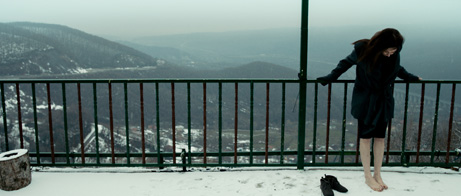
LIFELONG (HAYATBOYU) 2013
Director/Writer: Aslı Özge
Cast: Defne Halman, Hakan Çimenser, Gizem Akman, Onur Dikmen
Turkey/Germany/Netherlands Drama 102min
Istanbul-born Aslı Özge follows her award-winning debut feature MEN ON THE BRIDGE (2009) with a visually chilly treatment of one marital crisis. The film premiered at the 2013 Berlinale and won the Best Director prize at last year’s Istanbul International Film Festival. Its subject matter and symbolic edge will no doubt draw (unfavourable) comparisons to Joanna Hogg’s recently released EXHIBITION; both films received their Austrian premieres during this year’s Crossing Europe Film Festival in Linz.
Opening in the middle of a sex scene between a woman and her husband, LIFELONG (HAYATBOYU) might suggest on first appearance that its central relationship is a healthy and functional one. It soon becomes apparent, however, that the fizz has gone from this marriage: but for one other brief moment of lust, Özge’s second feature unfolds in an emotionally constipated register while accruing evidence of its principal couple’s gradual and inexplicable estrangement from one another.
Middle-aged artist Ela (Defne Halman) is preparing for a new exhibition; her husband Can (Hakan Çimenser) is an architect. Their plush Istanbul home, with its immaculate glass panes and idiosyncratic geometry, speaks of a hard-earned social status. Like the house itself, though, the emphasis is very much upon the surface: left alone after daughter Tan moved away to study in Ankara, a discontentment has bubbled beneath. Clues of such tension are dropped early. Can’s phone vibrates when he’s out the room, and we see in Ela’s response to it a half-concealed acknowledgement of a secret she’s reluctant to confront.
Said secret is that Can is likely having an affair. And since she hasn’t been given the luxury of a close confidante, Ela’s suspicions and reasons for not challenging her husband are left to suggestion – though there are strong implications that her silence stems from an approaching menopausal insecurity and a rapidly declining self-worth. Framed – in its first half at least – through Ela’s perspective, Özge’s film is subsequently as restrained as its female protagonist. It’s to the writer-director’s credit that things open out in the second half in order to humanise Can – who, it must be said, is for too much of the film so unchangingly neglectful a partner that one is never really convinced of him as having been ‘marriage material’ to begin with.
Indeed, one comes to cringe in advance whenever Ela and Can are together, the former suffering one putdown after another. An early example is when Ela returns home one evening and comes to bed, only for Can to announce he’s going out to meet colleagues from Antalya. Another example is when Can quietly berates Ela following a double-date with friends – in which an innocuous comment concerning an e-mail from Can reveals Ela was not its intended recipient. Such scenes mount; the drama wears thin. It would surely have been more of a challenge – for filmmaker and audience alike – to write the husband character as something more nuanced than an overwhelmingly sloppy, one-dimensional loser. An awkward scene in a restaurant concerning a messed-up mixed grill feels merely clichéd.
Things change when an earthquake occurs – one with allegorical import no less. Though its epicentre is some distance away (Ela and Can sleep through it), the quake’s ripple effects come to determine Ela’s course of action – and, perhaps, Can’s awakening-cum-redemption. In the second half of the film, Özge demonstrates a clear penchant for symbolism as well as for patient and quiet revelations – though the dramatic cut-to-black that punctuates the ambiguous final scene betrays a more routine aesthetic approach than might otherwise have been the case. In forcing its characters to re-evaluate their situation, the earthquake is at once a subtle and obvious deus ex machina: subtle because its emotional ramifications aren’t felt immediately, and obvious because tectonic collisions have felt forced ever since Altman’s Short Cuts (1993). At least it wasn’t a car crash. MICHAEL PATTISON.